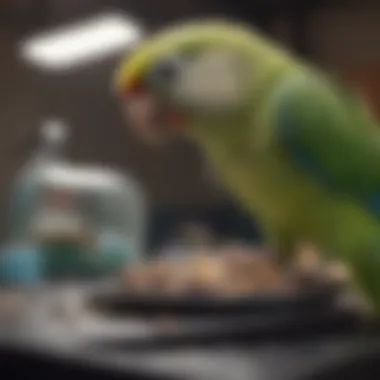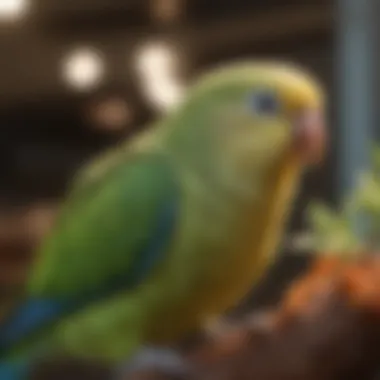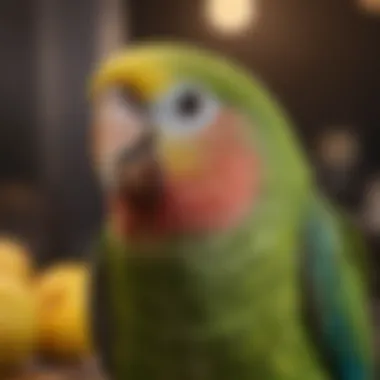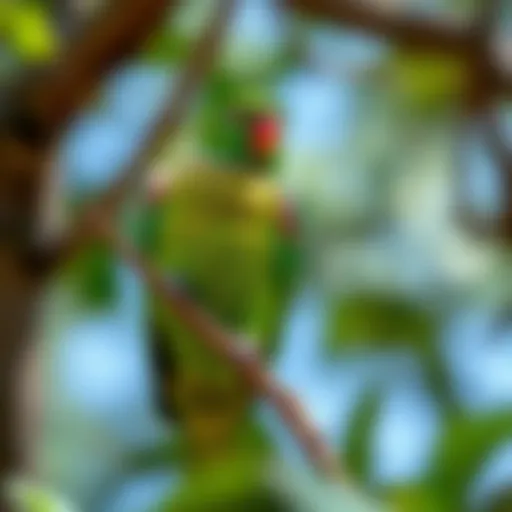Essential Guide to Caring for Sick Parakeets


Intro
Caring for a sick parakeet can feel like walking a tightrope. One moment, they seem fine, a blur of vibrant colors fluttering around their cage, and the next, they’re lethargic, perched silently as if waiting for change. Understanding how to approach their care during these tougher times is crucial for any bird owner. Being adept at recognizing symptoms early can save not just time, but also your bird’s life.
This guide is designed to bridge the gap between basic avian care and specific strategies for handling illness. We’ll delve into the critical aspects of parakeet health, equipping you with knowledge about nutrition, signs of distress, and the importance of timely veterinary consultations. Let’s take a moment to explore the fundamentals before we dive deeper into the specifics of sickness management.
Understanding Parakeet Health
Caring for parakeets demands a well-rounded understanding of their health. This knowledge allows owners to notice changes in their feathered companions and respond promptly. When you comprehend the nuances of parakeet wellbeing, it supports the prevention of diseases and enhances the quality of life for your pet. Understanding parakeet health entails being aware of common ailments, appreciating the significance of nutrition, and recognizing behavioral and physical signs of potential issues.
Adopting a proactive approach to health, feeding, and overall care benefits both the bird and the owner. Regular health monitoring not only enhances the maintenance routine, but it also fosters a deeper bond between the parakeet and owner, making everyday interactions more enjoyable and fulfilling.
This section dives into the critical aspects of parakeet health, focusing on foundational knowledge that will prepare you to detect and respond to health concerns as they arise.
Initial Considerations
Before diving deep into common diseases and symptoms, it’s crucial to evaluate the overall environment and lifestyle that your parakeet experiences. Each bird is unique, and understanding their individual needs is the first step in promoting good health.
If you’ve recently welcomed a parakeet into your home, take time to observe its behavior and surroundings. Is there adequate space for flight and play? Is the cage properly ventilated and cleaned? These foundational factors set the stage for a healthy life.
Common Parakeet Diseases
Psittacosis
A notable disease affecting parakeets, psittacosis, is caused by the bacterium Chlamydia psittaci. This illness manifests through respiratory symptoms and can escalate without immediate attention. The characteristic feature of psittacosis is its contagious nature, not only affecting birds but also posing a risk to humans. This duality makes it a pertinent topic in this guide.
While some may feel overwhelmed by the mention of such diseases, understanding psittacosis's implications can lead to quicker identification and treatment. The disease's hallmark symptom is a change in your parakeet's behavior, typically becoming lethargic or losing its vibrant energy.
Avian Influenza
Avian influenza, or bird flu, is another illness that can impact parakeets. This viral infection is recognized for its potential severity and rapid spread among avian populations. The key aspect of avian influenza is its ability to evolve, which complicates vaccination efforts. The uniqueness here lies in the fact that not all strains affect parrots or parakeets the same way, causing variable symptoms ranging from mild to severe.
While it's not the most common illness in parakeets, awareness of it is crucial. Educating yourself about avian influenza empowers you to take appropriate action should your pet exhibit any concerning behaviors or symptoms.
Polyomavirus Infections
Polyomavirus infections are known particularly in younger parakeets and can lead to sudden death if not managed properly. The key characteristic of this virus is its sometimes hidden nature, making early detection challenging. The unique feature of these infections is that they mainly target the feather follicles, causing feather loss and growth delays. This makes it essential to keep an eye on feather development.
Understanding polyomavirus gives insight into preventative measures and the importance of vaccinations available for your parakeet. Given the stress of possible illness, knowing what to look for can minimize anxiety.
Recognizing Symptoms of Illness
Moving on, recognizing symptoms of potential illness is vital. Swift action can mitigate health problems, leading to better outcomes for your parakeet.
Changes in Appetite
Changes in appetite can serve as a significant indicator of health issues in parakeets. You might notice your parakeet eating less or becoming particular about its food choices. This change can be one of the first signs that something is amiss, making its recognition critical.
Understanding your bird’s typical eating habits can help identify subtle shifts that could indicate discomfort or illness. This section will help shed light on how to interpret these signs effectively.
Behavioral Shifts
Parakeets are communicative creatures, and any shifts in their typical behavior can be alarming. A sudden change in activity, such as increased aggression or withdrawal, might signal discomfort or health problems.
Recognizing these behavioral changes is paramount. It helps in assessing whether intervention is necessary or if it’s just a passing phase. This guide emphasizes the value of understanding your parakeet's personality to catch these shifts early.
Physical Signs
Physical signs such as changes in plumage, discharge from the beak or eyes, and unusual droppings are all possible indicators of illness. A visibly fluffed-up bird may also signal that it’s not feeling well.
Detailed attention to these physical details not only aids in early detection of potential illnesses but can prove crucial during a vet consultation. Being able to accurately describe these signs to a veterinarian can make a significant difference in diagnosis and treatment.
Immediate Care Steps
Caring for a sick parakeet involves a series of immediate steps that can significantly affect their recovery. These steps are essential not only for quick intervention but also for ensuring the bird is in a comfortable and stable environment during this challenging time. When a parakeet shows signs of illness, a proactive approach becomes crucial. By implementing proper care strategies, pet owners can provide immediate relief and create a conducive space for healing.
Creating a Safe Environment
A safe environment acts as the foundation for any recovery plan. When birds are unwell, they require peace and quiet to regain their strength. A well-structured space can greatly impact a bird's health and comfort.
Reducing Stress Factors
Reducing stress factors is paramount when caring for a sick parakeet. High stress levels can exacerbate health conditions and slow down the healing process. Maintaining a calm atmosphere in the bird’s habitat is essential. This involves minimizing loud noises, avoiding abrupt movements near the cage, and keeping other pets at bay. A quiet corner of the house may serve as a new home base for the sick parakeet.
Key characteristic here is the calming effect that a stress-free environment brings. It's a well-known fact in avian care that stressed birds can shy away from food or water, which can worsen their condition. However, making small changes, like placing a cover over part of the cage or using softer lighting, can make a world of difference. The advantage of this method is the positive reinforcement of recovery through environmental adjustment, cultivating a space that promotes peace rather than anxiety.
Adjusting Temperature and Light
Adjusting temperature and light in the parakeet’s environment is another vital consideration. Parakeets thrive in stable conditions, and sudden changes can lead to further distress. A minor fluctuation in temperature or inappropriate lighting can trigger discomfort or even illness.
The optimal condition for parakeets is typically room temperature, but caution should be taken to avoid drafts or direct sunlight. Providing warm areas using heat lamps or cozy blankets designed for avian use can help alleviate ailments, especially in cooler months. Moreover, adjusting the light cycle to mimic their natural day and night rhythm helps in establishing a sense of normalcy.
This approach is beneficial because it stabilizes their surroundings, thus fostering a quicker recovery. However, it’s essential not to overheat the area as excessive warmth can be just as harmful. Finding that sweet spot is crucial for the wellbeing of your feathered friend.
Hydration and Nutrition


Hydration and nutrition are the lifeblood of any recovery plan. Sick parakeets experience changes in their dietary needs, so it's vital to focus on their hydration levels and food intake.
Importance of Fluid Intake
Importance of fluid intake cannot be overstated. Just like humans, parakeets can become dehydrated, especially when they are not eating well. Providing fresh, clean water should be your number one priority. To encourage drinking, you might consider offering electrolyte solutions specifically designed for birds.
The key characteristic of ensuring optimal hydration is that it not only supports general health but also aids specific illness recovery, as fluids help flush out toxins and maintain organ functions. A slight dip in hydration can lead to severe complications, making this a critical focus area in any care regimen. The unique feature of fluid intake is how it supports overall body function during illnesses, yet care must be taken to rotate water daily to prevent bacteria growth.
Suitable Food Choices
When it comes to suitable food choices, the need for proper nutrition during illness can’t be ignored. Providing a mix of soft foods, like cooked vegetables and fruits, can be easier on the digestive system compared to standard seeds. Fresh options mixed with high-quality pellets ensure a balanced diet that offers the necessary vitamins and minerals.
The standout characteristic of quality nutrition is its direct link to energy levels and immune support. A well-fed parakeet is more likely to recover faster from illness. However, while homemade diets can be beneficial, they should always be balanced with nutritional requirements, and over-reliance on one type of food could lead to deficiencies. A carefully crafted diet can elevate not only recovery chances but also overall well-being.
Managing Omnivorous Diet Needs
Managing an omnivorous diet needs careful attention, as parakeets are not solely seed-eaters. Understanding their nutritional requirements is imperative, especially when they are under the weather.
Pelleted Foods versus Fresh Options
The choice between pelleted foods versus fresh options is often debated among avian keepers. Pelleted foods are specifically formulated to provide all essential nutrients in one convenient source. For sick parakeets, this can be a reliable base, ensuring they receive necessary vitamins without the fuss of preparing various fresh dishes.
The notable characteristic of pellets is their convenience and guaranteed nutritional content, making them a popular choice for bird owners. However, introducing fresh vegetables and fruits is still essential for variety and extra hydration. The downside of solely relying on pellets is the lack of palatability for some birds, who might refuse them when ill. Finding the appropriate balance between these options can support a healthy recovery.
Vitamins and Supplements
Vitamins and supplements can play a significant role in recovery, especially for parakeets lacking specific nutrients during their illness. Many bird owners opt for pharmaceutical-grade supplements to ensure their parakeets receive additional boosts, especially if they show signs of malnutrition.
These supplements often carry essential vitamins that can be lacking in homemade diets, promoting a quicker recovery. A key characteristic is their targeted functionality—specific vitamins cater to different health issues, ranging from feather growth to feather condition and general immune support. However, it’s important to consult with a veterinarian before administering any supplement to ensure it meets the unique needs of the sick bird. If mismanaged, over-supplementation can lead to toxicity, which can complicate an already delicate situation.
Monitoring and Observation
Caring for sick parakeets is by no means a walk in the park. This resonates especially in the realm of Monitoring and Observation. This crucial aspect augments your ability to assess and respond to your bird’s health needs effectively. By attentively documenting changes in behavior, physical condition, and any emerging symptoms, you create a clearer picture of your parakeet's overall wellness. This proactive approach not only helps catch health issues before they escalate but also strengthens the bond between you and your feathered companion.
Daily Health Checklists
Keeping tabs on your parakeet's condition starts with a solid daily health checklist. This simple practice can be a game changer in fostering an environment of attentive care.
Behavioral Observations
Observing your parakeet’s behavior can be enlightening. Certain changes might be subtle but can offer valuable insight into their well-being. Think about the times your parakeet seems withdrawn or overly vocal. These shifts often indicate underlying stress or illness. The beauty of Behavioral Observations lies in their adaptability; you can gauge how different environments or activities affect your bird's demeanor. This kind of observation is often regarded as a low-cost, high-reward method in the toolkit of avian care.
One unique feature of behavioral observation is the focus on social interaction. A parakeet that typically enjoys interaction but suddenly prefers solitude could be sending up warning flares about their health. Conversely, persistent aggression might hint at ailments that can’t be ignored. However, it's worth noting that some changes may be minor or situational. Thus, while beneficial, relying on behavioral observations alone may not paint the complete picture.
Physical Condition Assessments
Next up is Physical Condition Assessments. These assessments focus on evaluating the tangible signs of health, like feather condition, weight, and posture. Just like with behavior, noticing a lack of luster in feathers or disproportionate weight can be pivotal in understanding your parakeet's health state. The allure of physical assessments stems from their objective nature; this makes it easier to track changes over time, lending clarity to your observations.
The notable feature here is the straightforward metrics such as body weight, which can be directly measured and tracked. This gives a clearer snapshot of health versus the more fluid, subjective observations of behavior. But there’s a caveat: some health issues may manifest subtly, making regular checks critical. Relying solely on physical metrics, without considering behavior, might lead you to miss something crucial.
Recording Changes Over Time
Regularly recording these daily checks enables a nuanced view of your parakeet's health over time. Think of it as having a time-lapse video of your bird's condition; this chronology can be incredibly useful. It aids in spotting long-term trends, such as gradual changes that might suggest a developing health issue. You can use a simple notebook or even a phone app to jot down notes, making it easy to revisit your findings. Keeping diligent records also makes conversations with a vet more robust, supplying concrete data that might inform a diagnosis.
Identifying Urgent Signs for Medical Help
At times, no amount of observation can prepare you for what you might face. Some symptoms call for an immediate visit to the vet. This section is about recognizing those red flags that should make you pick up that phone.
Labored Breathing
Labored Breathing is a serious symptom that warrants your immediate attention. If your parakeet seems to struggle for air, this isn't just a case of feeling a bit off. This can indicate conditions such as respiratory infections or heart issues. Recognizing labored breathing can set the stage for prompt medical intervention, which is vital for a quick recovery. For owners who are tuned into their bird's condition, noticing this can mean the difference between swift treatment and a serious health crisis.
The unique aspect of labored breathing is how quickly it can progress. What may start as merely an abnormal sound can escalate rapidly if left unchecked, so it’s crucial to respond immediately. Ignoring this symptom could have devastating consequences, making it one of the red flags you need never overlook.
Severe Weight Loss
When we talk about Severe Weight Loss, we dive deeper into a symptom that screams trouble. If your parakeet is losing weight at a noticeable rate, this usually signals major health issues that could potentially lead to life-threatening conditions. Understanding this symptom's gravity allows pet owners to take immediate action by consulting with a vet or changing care methods.
A key focus of severe weight loss is its catch-22 nature. By the time an owner notices significant weight loss, the health concern may have well established itself. This makes regular monitoring of your bird’s weight essential, giving you an edge in catching problems early.
Unresponsiveness
Finally, let’s discuss Unresponsiveness. If your parakeet is lethargic or unresponsive when roused, the situation is likely dire. This symptom can be a harbinger of serious health concerns, ranging from illness to poisoning. The ability to recognize unresponsiveness can spell the difference between a bird that recovers and one that tragically does not.
The unique feature of this symptom is its relatively straightforward identification; a parakeet who doesn’t react to stimuli is barely functioning. This is a clear sign that something is very wrong. A swift response is not just recommended, but imperative. Ignoring unresponsiveness could lead to unthinkable consequences.
In summary, Monitoring and Observation is not just recommended but crucial in caring for sick parakeets. Comprehensive daily health checklists, recording changes, and recognizing urgent signs are key practices that empower pet owners to act decisively and responsibly.
Vet Consultation Essentials
When it comes to caring for a sick parakeet, consulting a vet can feel like a daunting task for many bird owners. However, grasping the importance of veterinary consultations is essential to ensure proper health management for your feathered friend. Regular visits to an avian veterinarian can help in early detection of health issues and provide valuable insights into the well-being of your pet.
Benefits of Vet Consultations:
A professional vet specializes in avian health, making them adept at spotting problems that an owner might miss. Moreover, they can recommend tailored treatments to address specific concerns, providing peace of mind in troubling times.
Preparing for a Veterinary Visit


Documenting Symptoms and Changes
Monitoring your parakeet’s behavior and health is crucial when preparing for a veterinary visit. Keeping an accurate record of symptoms and any noticeable changes not only aids the vet in making a proper diagnosis but also demonstrates your dedication as a caregiver.
Key Characteristic:
The notable aspect of documenting symptoms is that it serves as a baseline for understanding your bird’s usual behavior and health. It’s a beneficial method for anyone wanting to be proactive in their pet’s care.
Unique Feature:
A well-documented record might include details such as changes in eating habits, vocalizations, or even interaction levels. This approach ensures that you're providing your veterinarian with comprehensive information, increasing the likelihood of a successful diagnosis and treatment plan.
Gathering Medical History
Another important step is gathering your parakeet’s medical history, including past illnesses, vaccinations, and any previous vet visits. This background can be pivotal in understanding the current health issue.
Key Characteristic:
The medical history provides essential context, allowing the vet to take a more informed approach to diagnosis and treatment. This is especially crucial if your parakeet is experiencing symptoms that could relate to a long-standing condition.
Unique Feature:
Providing a complete medical history may also lead to quicker and more effective treatment, as the vet can identify patterns or recurring problems. Conversely, a lack of proper history might delay diagnosis, prolonging distress for both you and your parakeet.
Understanding Diagnostic Tests
Blood Tests
Blood tests are often a standard procedure during a veterinary consultation for sick parakeets. They help uncover hidden health issues that a vet may not easily detect through physical examination.
Key Characteristic:
Blood tests can reveal a lot about an avian’s organ function and overall health status. They are a popular choice among vets because they can provide immediate insights into various health conditions.
Unique Feature:
While they can be a bit intimidating for both the owner and the bird, blood tests offer significant advantages. They can indicate the presence of infections, nutritional deficits, and even identify hormonal imbalances, all of which inform better treatment decisions.
Imaging Techniques
Imaging techniques, such as X-rays or ultrasounds, are other diagnostic tests often employed by avian vets. These tools allow for a deeper understanding of your parakeet's internal health.
Key Characteristic:
Images can reveal structural abnormalities or issues not identifiable through other tests. This characteristic makes them particularly beneficial when a vet suspects internal issues like tumors or organ enlargement.
Unique Feature:
Though these procedures come with some risks and require sedation, the information gleaned can be invaluable. Understanding the internal landscape of your pet’s health equips you and the vet with crucial knowledge for recovery strategies.
Post-Consultation Care
Following Vet Instructions
After leaving the veterinary office, the importance of adhering to the vet's instructions cannot be overstated. Thoroughly following prescribed medications or treatment plans is essential for your parakeet’s recovery.
Key Characteristic:
This aspect is crucial in ensuring that any interventions positively impact your bird's health. Properly administering medication and adjustments in care routines can lead to a swift and effective recovery.
Unique Feature:
While it may seem straightforward, sticking to the vet’s guidelines often involves incorporating new routines, such as specific feeding schedules, symptom monitoring, or behavioral adjustments. Not following up could risk hindering the healing process or exacerbating the condition.
Monitoring Medication Effects
Vigilantly watching for reactions or changes after starting a medication is important. It allows for immediate reporting of adverse effects or lack of improvement, ensuring timely adjustments can be made.
Key Characteristic:
This practice enhances the probability of successful treatment. By keeping an eye on how your parakeet reacts, any negative side effects can be reported back to your vet without undue delay.
Unique Feature:
While continuously monitoring can be taxing on an owner, it’s a small price to pay for your pet’s health. This focused attention can sometimes lead to a more tailored approach to treatment, adjusting medications or dosages based on individual reactions.
Preventive Health Measures
When it comes to caring for parakeets, preventive health measures are crucial. Just like us, these vibrant little creatures require regular attention to stay healthy and vibrant. Preventing illness is always better than trying to treat it later. By establishing good habits and routines, you create a protective shield around your feathered friend, enhancing their quality of life while reducing veterinary bills.
Regular Health Check-Ups
Establishing a Check-Up Schedule
Setting up a check-up schedule can make a world of difference in maintaining your parakeet's health. It’s not just about the yearly vet visit; it’s about creating a rhythm in their care. Regular small checks allow you to catch potential issues before they snowball into bigger problems.
A consistent check-up routine helps in building trust between you and your parakeet, making vet visits less stressful for both parties. These can include light physical exams that monitor weight, feather condition, and overall behavior. Although there’s no hard-and-fast rule, every six months is a pretty solid choice for routine checks.
Unique feature: Health checks can often reveal subtle changes that might go unnoticed otherwise. For instance, a drop in weight or a change in plumage could signal something amiss. By noticing these changes early, you gain an advantage in intervention, enhancing your pet's chances of recovery if they do become ill.
Importance of Vaccinations
Getting your parakeet vaccinated is another essential preventive health measure. While many might think vaccinations are only for mammals, they play a vital role in poultry health too. Routine vaccinations can help protect against diseases like psittacosis or avian influenza, which can be fatal.
Key characteristic: Vaccinations act like a shield, preventing your parakeet from encountering serious infectious diseases. Staying on top of vaccinations is not just beneficial; it’s a responsibility for every parakeet owner. It ensures that your pet remains healthy and safe while also protecting other birds in the area.
A unique feature of vaccinations is their ability to keep entire flocks safe. If you have multiple birds, a single unvaccinated parakeet can jeopardize the health of the others. Therefore, being consistent with vaccinations is a crucial part of any proper avian care routine.
Maintaining a Balanced Diet
Nutritional Variety
Balanced nutrition plays a key role in preventing health issues in parakeets. Offering your bird a diverse diet not only ensures they receive essential nutrients but keeps them mentally stimulated as well. Parakeets thrive on a mix of seeds, fruits, vegetables, and specialized pellets.
The unique aspect here is that variety helps prevent the risk of obesity or malnutrition. A monotonous diet may lead to deficiencies while overindulging in seeds can result in health problems like fatty liver disease. Aim for a balanced mix to support their overall well-being.
The nutritional variety also introduces enrichment into your bird's life. Think of it as giving your parakeet a mini buffet every day, inviting them to peck at different tastes and textures.
Avoiding Harmful Foods


Knowing what not to feed your parakeet is just as important as providing a nutritious diet. Some common foods like avocado, chocolate, and caffeine can be lethal for birds. By eliminating these harmful items from their diet, you keep your little companion safe.
The key characteristic here is vigilance. Being aware of what foods are harmful can prevent severe health issues. All it takes is one slip for a tasty treat to turn into a nightmare.
Unique features of avoiding harmful foods include creating a safe environment through education. By understanding which foods may cause issues, you become a more informed caretaker. This knowledge empowers you to make better choices, thus enhancing the health and lifespan of your parakeet.
Environmental Enrichment Techniques
Interactive Toys
Providing your parakeet with interactive toys not only keeps them entertained but also contributes to their overall health. Birds are intelligent creatures that require stimulation to thrive. Toys that encourage problem-solving skills keep their minds sharp and prevent boredom from setting in.
Key characteristic: Interactive toys can help prevent destructive behaviors often associated with boredom. A well-occupied bird is a happy bird! Incorporating various toys allows for physical activity, which is essential for maintaining a healthy weight and muscle tone.
A unique aspect of such toys is their ability to mimic natural behaviors. For instance, foraging toys encourage the kind of instinctual behaviors that parakeets would engage in during their natural habitat, thus promoting both mental and physical well-being.
Social Interaction Strategies
Parakeets are social animals, which means they thrive on interaction. If you can’t always be around, consider strategies to keep your parakeet socially engaged. This can mean spending quality time with them daily or introducing companions, like another bird, if feasible.
The importance of social interaction simply can’t be overstated. A parakeet that feels lonely may exhibit signs of stress or depression, impacting their overall health. Keeping them social leads to positive emotional states and fewer health complications down the line.
Unique features of social interaction include forming stronger bonds between you and your parakeet. The more you engage with them, the more they trust you, creating a nurturing environment that continuously supports their emotional and mental health.
Emotional and Psychological Wellbeing
Caring for sick parakeets goes beyond just addressing their physical ailments. One crucial aspect often overlooked is their emotional and psychological wellbeing. This subject plays a major role in their recovery and overall quality of life. Parakeets, like many animals, can experience stress, anxiety, and depression, especially in times of illness. Understanding how to foster a supportive environment can truly make a difference.
Recognizing Signs of Stress
Stress can manifest in various forms, and identifying those signs early is essential. Parakeets may become more withdrawn, less active, or even more aggressive when they are feeling uneasy. Some common indicators include:
- Excessive feather plucking
- Changes in vocalization, such as excessive screaming or complete silence
- Loss of appetite or overeating
- Rapid breathing, pacing, or other signs of agitation
Being attuned to these signs allows pet owners to take immediate action, thus creating a calming environment for their feathered friends.
Establishing a Bond with Your Parakeet
Importance of Interaction
Interaction is the bedrock of a strong relationship between you and your parakeet. Engaging regularly with your bird encourages trust, making it more likely to respond positively during distressing circumstances. Through daily conversations or simple activities, you can help alleviate your bird's anxiety. Moreover, bonding creates a sense of security that every parakeet craves. The key characteristic here is consistency; the more predictable your routine of interaction is, the better your parakeet will feel.
One unique feature of this interaction is how it can serve as a distraction during challenging times, such as illness or recovery. However, it’s also vital to understand your parakeet's personality, as some might prefer quiet companionship over active socializing.
Understanding Your Bird’s Personality
Every parakeet has its own quirks and inclinations. By understanding your bird's unique personality traits, you can tailor your care approach effectively. Some parakeets are naturally curious and social, while others may be more shy or reserved. Recognizing these behaviors can impact how you interact with them, making it a crucial aspect of overall wellbeing.
The realizing here is that a good understanding establishes trust, which is inherently beneficial—not just for bonding, but for managing stress as well. It allows you to approach your bird in ways that resonate with its comfort level, further enriching your relationship.
Managing Isolation Concerns
Providing Companionship
If a parakeet feels alone, it can lead to an array of emotional struggles that affect their health. Providing companionship, whether through a second parakeet or increased interaction from you, can significantly improve their mood. This practice ensures they aren’t left to their own devices during illness, which can exacerbate feelings of loneliness.
The characteristic of companionship here is reciprocal; it reinforces the connection between the owner and pet. However, it's critical to introduce any new companion slowly, as a sudden change can do more harm than good.
Ensuring Emotional Support
Emotional support comes in various shapes and sizes. It could mean spending quiet time together or speaking soothing words. This kind of attention offers a reliable source of comfort, especially when your parakeet is feeling under the weather.
The unique part about providing emotional support is that it can be easily adapted to suit either you or your bird’s preferences. While some parakeets thrive on touch, others may feel overwhelmed by it. Knowing your bird's limits is essential for delivering effective emotional support.
In summary, attending to the emotional and psychological needs of your sick parakeet holds immense significance in their recuperation journey. By recognizing stress, engaging positively, and offering companionship, you’re investing in an environment that promotes healing, understanding, and ultimately stronger bonds.
Culmination and Future Care Strategies
Caring for sick parakeets is not a task to take lightly. After navigating through the complexities of avian health, it’s clear that a systematic approach can make all the difference in recovery and wellbeing. This conclusion isn’t about closing the book; it’s more of a reminder that the journey of care doesn’t end but rather evolves. The key themes you've explored throughout this article—recognizing symptoms, ensuring proper nutrition, creating a stress-free environment, and knowing when to seek professional help—form the cornerstone of a well-rounded care strategy.
Fostering a supportive environment plays a crucial role, as parakeets can be sensitive creatures. Future care strategies ought to include regular health assessments to keep tabs on their ongoing health. Whether it be minor behavioral changes, shifts in appetite, or their general demeanor, staying vigilant empowers you as a caretaker. Additionally, building a consistent routine can significantly reduce stress for your feathered friend.
Reflecting on Care Experiences
Reflecting on past care experiences is more than just pondering what worked or what didn’t. It provides valuable lessons and encourages growth in your caregiving approach. Every parakeet is unique; therefore, understanding the nuances of your bird’s behavior can steer future decisions. It’s important to take note of successful interventions—was it a certain type of food that made your parakeet perk up, or was it that extra hour of quiet in its environment?
Furthermore, sharing these reflections can foster a sense of community with other bird owners. By exchanging stories and experiences, you not only gain insights but can also develop a network of support that can be invaluable when challenging health issues arise.
Continuous Learning and Adaptation
Staying Informed About Avian Health
Staying informed about avian health means diving into resources and keeping abreast of current advancements, studies, and best practices in bird care. As the field of avian health evolves, so should the knowledge of every bird owner. This dedication to ongoing education arms you with the tools to tackle evolving challenges and makes you a better caretaker. The internet, forums, and local avian clubs can be treasure troves of information.
The key characteristic here is adaptability; the ability to alter your approach based on new findings. The unique feature of being proactive is that it allows for a more tailored care strategy, personalizing your parakeet’s needs. However, navigating through a plethora of information can sometimes be overwhelming.
Community Resources and Support
Community resources and support can significantly enhance your caregiving experience. Utilizing platforms like local pet organizations, avian veterinarians, and online forums fosters a sense of belonging within the bird-keeping community. These connections might also provide access to informative workshops or vet recommendations that otherwise could remain undiscovered.
The key characteristic of leaning on community resources is collaboration. You can tap into shared knowledge and experiences from other parakeet owners. A unique feature of community support is its crowd-sourced nature, allowing for various perspectives and approaches to care. Yet, while it can be beneficial, always cross-check advice to ensure it's grounded in credible information.
Engaging with like-minded individuals not only enriches your knowledge but reinforces the importance of compassion and understanding in the journey of caregiving.















